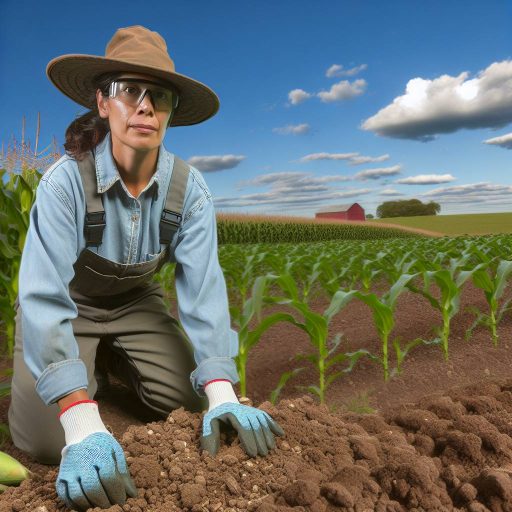Introduction:
The dairy industry plays a crucial role in providing various dairy products to consumers worldwide.
Dairy scientists are essential in ensuring the quality, safety, and innovation of these products.
Let’s explore the diverse career opportunities available for dairy scientists in this dynamic field.
Dairy Production and Technology:
Dairy scientists can work in dairy production, where they oversee the entire process of milk and cheese production.
They are responsible for ensuring that the products meet quality and safety standards.
Nutrition and Research:
Dairy scientists can also focus on nutrition and research.
They study the nutritional content of dairy products and develop new products to meet consumer demands for healthier options.
Quality Control and Assurance:
Quality control and assurance are crucial in the dairy industry.
Dairy scientists play a vital role in ensuring that products meet regulatory standards and are safe for consumption.
Product Development:
Dairy scientists are involved in product development, where they create new dairy products or improve existing ones.
They work closely with marketing teams to introduce innovative products to the market.
Environmental Sustainability:
Dairy scientists can also work on environmental sustainability projects.
They focus on reducing the environmental impact of dairy production and finding ways to make the industry more eco-friendly.
The dairy industry offers a wide range of career opportunities for dairy scientists.
Whether they are interested in production, research, quality control, product development, or sustainability, dairy scientists play a crucial role in shaping the future of the industry.
Education and Training Required for Dairy Scientists:
To become a dairy scientist, individuals typically need a Bachelor’s degree in dairy science, animal science, or a related field.
For more advanced positions, such as research or teaching roles, a Master’s or Ph.D. is often required.
Hands-on training is essential for dairy scientists, and this can be gained through internships or research projects.
Skills and Qualities Needed for Dairy Scientists:
Strong analytical skills are crucial for dairy scientists to collect, analyze, and interpret data effectively.
Transform Your Career Today
Unlock a personalized career strategy that drives real results. Get tailored advice and a roadmap designed just for you.
Start NowAttention to detail is important in dairy science to ensure accuracy in experiments and data collection.
Critical thinking skills are necessary for dairy scientists to solve complex problems and make informed decisions.
Communication skills are key for dairy scientists to effectively communicate research findings to peers and other stakeholders.
Job Duties and Responsibilities of Dairy Scientists:
Conduct research to improve dairy production, quality, and efficiency.
Develop new technologies and methods to enhance dairy farming practices.
Analyze data and research findings to make recommendations for improving dairy operations.
Work with farmers and industry professionals to implement research findings into practice.
Career Opportunities for Dairy Scientists:
Dairy scientists can work in various settings, including research institutions, government agencies, dairy farms, and food companies.
Some dairy scientists focus on research and development, while others work in quality control or production management.
Job titles for dairy scientists may include dairy technologist, research scientist, quality assurance manager, or product development specialist.
With experience and advanced degrees, dairy scientists can advance to leadership roles or start their consulting firms in the dairy industry.
Salary and Job Outlook for Dairy Scientists:
According to the Bureau of Labor Statistics, the median annual wage for agricultural and food scientists, including dairy scientists, was $65,160 in May 2020.
Job growth for agricultural and food scientists is projected to be 6% from 2020 to 2030, which is about as fast as the average for all occupations.
The demand for dairy scientists is expected to remain steady as the dairy industry continues to evolve and adopt new technologies and practices.
Overall, career opportunities for dairy scientists are promising, especially for those with advanced degrees and specialized expertise in dairy science.
Dairy Scientists in Agriculture
Dairy scientists play a crucial role in the agricultural industry.
They specifically focus on the production and maintenance of dairy products.
This career path offers a range of job duties.
These duties provide exciting opportunities for professionals.
Let’s delve into the essential job duties of dairy scientists.
Transform Your Career Today
Unlock a personalized career strategy that drives real results. Get tailored advice and a roadmap designed just for you.
Start NowConducting Research to Improve Dairy Production Processes
One of the primary responsibilities of dairy scientists is conducting research.
They aim to enhance the efficiency and effectiveness of dairy production processes.
This involves studying various aspects of dairy farming.
Areas of focus include animal nutrition, breeding practices, and environmental factors.
Developing New Dairy Products
Dairy scientists are involved in developing innovative dairy products.
They work closely with food technologists and researchers.
Their goal is to create new recipes, formulations, and packaging designs.
Ensuring the Health and Well-being of Dairy Animals
Another critical duty of dairy scientists is ensuring the health and well-being of dairy animals.
This includes implementing disease prevention measures.
They monitor animal nutrition and provide veterinary care when necessary.
Dairy scientists also maintain high standards of animal welfare on dairy farms.
Monitoring and Analyzing Milk Quality
Dairy scientists are responsible for monitoring and analyzing milk quality.
This involves conducting tests to assess milk composition.
They also evaluate sensory attributes and microbiological safety.
Additionally, they evaluate milk processing practices.
The goal is to ensure the production of safe and high-quality dairy products.
Additional Responsibilities
- Collaborating with industry stakeholders to address challenges in the dairy sector.
- Participating in educational outreach programs to promote dairy industry awareness.
- Conducting training sessions for dairy farmers on best practices and regulations.
- Contributing to scientific publications and presentations to share research findings.
A career as a dairy scientist offers a diverse range of job duties.
These duties can have a meaningful impact on the dairy industry.
Dairy scientists conduct research to improve production processes.
They also develop new dairy products and ensure animal welfare.
Transform Your Career Today
Unlock a personalized career strategy that drives real results. Get tailored advice and a roadmap designed just for you.
Start NowIf you are passionate about agriculture and science, consider this rewarding career.
Delve into the Subject: Poultry Science: Impact on Food Safety
Career Paths for Dairy Scientists:
Dairy scientists can pursue a career in academia or research institutions.
They can conduct studies on dairy products and processes.
In food companies, they can work on developing new and innovative dairy products.
This role involves creating recipes and testing different ingredients.
They also ensure product quality throughout the development process.
Dairy scientists can work in dairy processing plants to ensure products meet quality standards.
They are responsible for testing samples and monitoring production processes.
Identifying areas for improvement is also part of their role in quality control.
Dairy scientists can provide consulting services to dairy farms or businesses.
They help improve operations, offering advice on nutrition and breeding.
Herd management and sustainability practices are also part of their consulting services.
They have a variety of career paths available, ranging from research to consulting.
Each path offers unique opportunities for professionals in the dairy industry.
Uncover the Details: Pest Management vs. Plant Pathology: Differences
Salary and Benefits for Dairy Scientists:
As dairy scientists progress in their careers, they can expect to see a significant increase in salary.
Here are the average salary ranges for entry-level, mid-level, and senior positions:
- Entry-level dairy scientists typically earn between $40,000 and $60,000 per year.
- Mid-level dairy scientists with several years of experience can earn between $70,000 and $90,000 per year.
- Senior dairy scientists, who often hold leadership roles or specialized positions, can earn upwards of $100,000 per year.
In addition to competitive salaries, dairy scientists can also enjoy a range of benefits that help support their overall well-being and professional growth.
Some common benefits offered to dairy scientists include:
Transform Your Career Today
Unlock a personalized career strategy that drives real results. Get tailored advice and a roadmap designed just for you.
Start Now- Healthcare benefits, including medical, dental, and vision coverage.
- Retirement plans, such as 401(k) matching and pension options.
- Professional development opportunities, including conferences, workshops, and continuing education programs.
Furthermore, many dairy science roles offer the potential for bonuses or profit-sharing opportunities based on individual and team performance.
These financial incentives can provide an extra source of income and motivation for dairy scientists to excel in their work.
The combination of competitive salaries, comprehensive benefits packages, and potential for bonuses make a career in dairy science a rewarding and financially stable choice for those passionate about the field.
Find Out More: How to Maintain Compliance in Agricultural Lending
Job Outlook for Dairy Scientists:
- Growing demand for dairy scientists due to advancements in technology and research
- Opportunities for specialization in areas such as nutrition or genetics
- Potential for career advancement to management or leadership roles
The Demand for Dairy Scientists
With the constant advancements in technology and research in the dairy industry, there is an ever-growing demand for dairy scientists.
These professionals are crucial for developing innovative products, improving production processes, and ensuring the quality and safety of dairy products.
Specialization Opportunities
Dairy scientists have the opportunity to specialize in various areas within the field.
One common specialization is in nutrition, where they focus on developing dairy products that meet specific nutritional needs or requirements.
Another popular specialization is genetics, where dairy scientists work on breeding programs to enhance the quality of dairy cattle.
Career Advancement
For dairy scientists looking to advance their careers, there are plentiful opportunities to move into management or leadership roles.
With experience and expertise, they can progress to roles such as research director, quality assurance manager, or even Chief Science Officer in dairy companies or research institutions.
The job outlook for dairy scientists is promising. There is a growing demand for their expertise, opportunities for specialization, and avenues for career advancement.
As the dairy industry continues to evolve, dairy scientists will play a crucial role in driving innovation and ensuring the sustainability of dairy production.
Explore Further: History and Evolution of Extension Services

Skills and Qualities Needed for Success as a Dairy Scientist:
– Possess strong analytical and problem-solving skills
– Demonstrate attention to detail and accuracy
– Ability to work effectively both independently and as part of a team
– Show passion for the dairy industry and commitment to sustainable practices
As a dairy scientist, there are certain skills and qualities that are essential for success in this field.
These skills are not only important for performing day-to-day tasks but also for advancing in your career and making a meaningful impact on the industry.
Transform Your Career Today
Unlock a personalized career strategy that drives real results. Get tailored advice and a roadmap designed just for you.
Start NowStrong Analytical and Problem-Solving Skills:
One of the key skills that a dairy scientist must possess is strong analytical and problem-solving skills.
This is essential for interpreting data, conducting experiments, and making critical decisions based on research findings.
The ability to analyze data and troubleshoot problems is crucial for identifying opportunities for improvement and innovation within the dairy industry.
Attention to Detail and Accuracy:
Attention to detail and accuracy are critical skills for dairy scientists.
In this role, even the smallest mistake can have significant consequences, so it is important to be meticulous and thorough in your work.
Paying attention to details ensures that experiments are conducted accurately, data is recorded correctly, and results are interpreted precisely.
Ability to Work Independently and as Part of a Team:
Dairy scientists often work on research projects independently, so the ability to work autonomously is important.
However, collaboration is also a key aspect of the job, as dairy scientists frequently work in multidisciplinary teams to achieve common goals.
Being able to work effectively both independently and as part of a team is essential for success in this field.
Passion for Dairy Industry and Commitment to Sustainable Practices:
Having a genuine passion for the dairy industry and a strong commitment to sustainable practices are qualities that can set a dairy scientist apart.
A deep interest in the industry motivates scientists to make valuable contributions and drive positive change.
Additionally, a commitment to sustainability ensures that scientists are mindful of the environmental impact of their work and strive to implement practices that promote long-term sustainability.
Networking and Professional Development Opportunities for Dairy Scientists:
Joining professional organizations
- Be part of the American Dairy Science Association
Attending events
- Participate in conferences, workshops, and seminars
Building connections
- Network with industry professionals and potential employers
Dairy scientists can benefit greatly from networking and professional development opportunities.
By joining professional organizations such as the American Dairy Science Association, professionals can stay updated on the latest trends and research in the industry.
Attending conferences, workshops, and seminars is another excellent way for dairy scientists to expand their knowledge and skillset.
These events provide a platform for industry experts to share insights and best practices.
Building connections with industry professionals and potential employers is crucial for career advancement.
Networking allows dairy scientists to establish relationships that can lead to job opportunities, collaborations, and mentorship.
Professional organizations like the American Dairy Science Association offer networking events, workshops, and webinars specifically tailored to dairy scientists.
These platforms provide a valuable opportunity to connect with peers and industry leaders.
Transform Your Career Today
Unlock a personalized career strategy that drives real results. Get tailored advice and a roadmap designed just for you.
Start NowEngaging in networking activities can also help dairy scientists stay current with industry trends and advancements.
By exchanging ideas and experiences with other professionals, individuals can gain new perspectives and insights into their field.
Attending industry events not only provides dairy scientists with valuable knowledge but also enhances their visibility within the industry.
Making a strong impression on industry professionals can open doors to new career opportunities and collaborations.
Building a strong network of contacts can also lead to mentorship opportunities for dairy scientists.
Establishing relationships with experienced professionals can offer guidance and support as individuals navigate their career paths.
Overall, networking and professional development opportunities play a crucial role in the career growth of dairy scientists.
By actively participating in these activities, professionals can expand their knowledge, build connections, and advance their careers in the dairy industry.
Career Opportunities for Dairy Scientists
Dairy scientists can work in research, quality control, or dairy product development.
They can also pursue careers in food safety, nutrition, or regulatory affairs.
Opportunities exist in academia, government agencies, and private industries.
Dairy scientists play a crucial role in ensuring the safety and quality of dairy products.
Exploring Diverse Career Paths
The field of dairy science offers a wide range of career opportunities.
Aspiring dairy scientists should explore the diverse paths available.
By staying informed, connected, and dedicated, individuals can succeed in this rewarding profession.
Additional Resources
Dairy Farmers of America Careers | Discover Endless Career …




